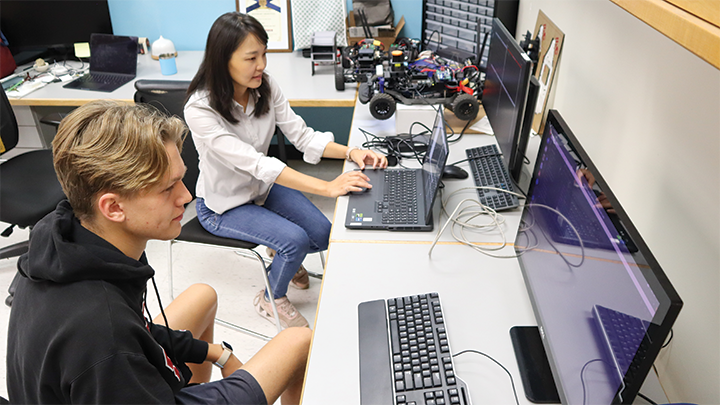New cybersecurity center boosts SDSU’s cyber research and teaching capabilities
Center provides a unique opportunity to prepare students for critical roles in a growing field

San Diego State University has announced the launch of a new cybersecurity center to bolster the university’s ongoing and future cybersecurity-related research and education efforts.
The Cybersecurity Center for Research and Education (CSCRE) will be managed by its founding director, professor Rob Beverly. Beverly joined the university’s computer science faculty in fall 2024 after serving as a program director in the National Science Foundation’s Office of Advanced Cyberinfrastructure.
The center aims to foster innovative research that addresses real-world cybersecurity problems, while expanding SDSU’s educational curriculum on digital forensics and reverse engineering, wireless security, cybersecurity management, and embedded systems security.
The center builds on ongoing university efforts across a variety of disciplines and divisions, including the College of Sciences’ Computer Science department, the College of Engineering’s Electrical and Computer Engineering departments, Fowler College of Business’ Management Information Systems (MIS) department, the Division of Research & Innovation, Graduate Program in Homeland Security, and the Information Technology Division.
“There's this complementary and inseparable link between research and education, and cybersecurity is a very fast moving field,” said Beverly. “One of the things that we really want to do to prepare students for the workforce is not only give them the cutting edge skills that they need for today, but to also understand what it means to do research so that they're prepared as the field evolves and changes.”
As technology has advanced, cybersecurity has evolved into its own discipline, much like computer science, which originally stemmed from mathematics and physics. In San Diego alone, the cybersecurity industry impacts 26,000 jobs and generates an annual $4 billion for the local economy.
These technologies also come with vulnerabilities that hackers can exploit to wreak havoc on virtual and real-world systems such as transportation, utilities and finance. Safeguarding the security and efficiency of cyber systems has become even more critical, requiring a multidisciplinary workforce of coding, engineering, ethics and management experts.
“The establishment of this new cybersecurity center demonstrates the university’s commitment to advancing STEM infrastructure and opportunities that prepare students for making a positive impact on the local community,” said Jeff Roberts, College of Sciences dean. “The center represents a coordinated effort to build on SDSU’s existing cyber initiatives, providing the training our students need for careers in this ever-evolving, ever more important field.”
“The interdisciplinary nature of the center will create more opportunities for students, strengthen research collaborations, and help address the shortage of cybersecurity professionals in the workforce,” said Dan Moshavi, dean of SDSU’s Fowler College of Business.
The center also offers innovative research opportunities for students of all levels, faculty and postdocs to tackle real-world cybersecurity issues. Current research topics include blockchain security, which is critical for protecting financial data, as well as the security of the Internet routing system, which involves encrypting messages to prevent attackers from interfering with private communication networks, and even cyber-physical systems to ensure the security of power plants and other major infrastructural facilities.
The center also hopes to foster continued research on AI robustness, trustworthiness and security.
Partnerships with the San Diego Cybersecurity Center of Excellence (CCOE), student groups such as SDSU Cyber Defense Club, as well as the new San Diego Cyber Clinic, a Google-funded cybersecurity clinic, and other initiatives within the university’s Graduate Program in Homeland Security will be key as the center grows.
“This initiative not only underscores SDSU’s commitment to advancing cybersecurity research but also leverages the robust capabilities of our NSF-funded TIDE high-performance computing infrastructure,” said James Frazee, vice president for Information Technology and chief information officer. “By building on the region’s rich history of cybersecurity innovation, we aim to enable groundbreaking research and develop the next generation of cybersecurity professionals. Our center will serve as a hub for collaboration, bringing together academia, industry, and government to address the most pressing cybersecurity challenges of our time.”
During the center’s first year, Beverly said he and his colleagues plan to bolster the center’s programs and achieve certification as an NSA-designated Center of Academic Excellence, which would pave the way for even more career and research funding pathways.



